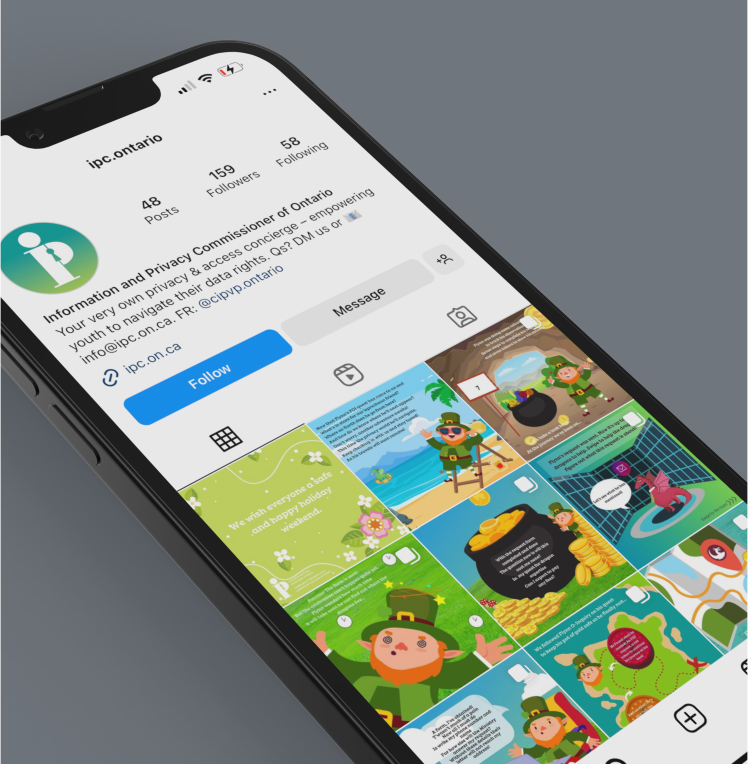To be a modern and effective regulator with real-world impact
enhance Ontarians’ trust that their privacy and access rights will be respected by:

Proactively advancing their rights in key strategic areas that impact their lives
-
Advance Ontarians’ privacy and transparency rights in a modern government by working with public institutions to develop bedrock principles and comprehensive governance frameworks for the responsible and accountable deployment of digital technologies.
-
Champion the access and privacy rights of Ontario’s children and youth by promoting their digital literacy and the expansion of their digital rights while holding institutions accountable for protecting the children and youth they serve.
-
Contribute to building public trust in next-generation law enforcement by working with relevant partners to develop necessary guardrails for the adoption of new technologies and community-based approaches that protect both public safety and Ontarians’ access and privacy rights.
-
Promote confidence in digital health by guiding custodians to respect the privacy and access rights of Ontarians, and supporting the pioneering use of personal health information for research and analytics to the extent it serves the public good.

Addressing complaints and appeals in a fair, timely and meaningful manner
-
Provide timely resolution to Ontarians’ access appeals and privacy complaints by defining and upholding applicable service standards.
-
Issue concise and plain language decisions that are fair and meaningful to the parties and support compliance with the law.
-
Support understanding of the law and participation in the IPC appeals process by publishing actionable guidance based on trends and lessons learned from individual cases.

Maintaining their confidence in the organizational excellence of the IPC
-
Transform the IPC into a digitally friendly organization by delivering services more effectively and efficiently online, while improving user experience.
-
Build the IPC into an employer of choice by attracting and retaining high quality talent and developing a positive corporate culture through enhanced employee programs and engagement.
-
Strengthen IPC governance and accountability through modern controllership best practices and prudent fiscal management.
- We will consider accessibility and equity issues to help reduce disparate outcomes for marginalized communities.
- We will strive to be consultative and collaborative with relevant partners and stakeholders.
- We will develop the knowledge, skills, and capacity needed, both internally and externally, to advance IPC’s goals.
- We will be bold and aspirational in our vision, but also stay grounded in pragmatism.
We treat all people with respect and dignity, and value diversity and inclusiveness.
We take accountability for our actions and embrace transparency to empower public scrutiny.
We make decisions that are impartial and independent, based on the law, using fair and transparent procedures.
We work constructively with our colleagues and stakeholders to give advice that is practical and effective.
We strive to achieve the highest professional standards in quality of work and delivery of services in a timely and efficient manner.

ADVOCACY
Proactively advancing Ontarians' rights in key strategic areas that impact their lives
Privacy and transparency in a modern government

On International Right to Know Day 2022, the IPC launched a Transparency Challenge, calling on public institutions subject to the Freedom of Information and Protection of Privacy Act (FIPPA) and the Municipal Freedom of Information and Protection of Privacy Act (MFIPPA) to share their innovative programs that improve government transparency for the benefit of Ontarians.
Privacy and Transparency in a Modern Government
Proposals for digital identity or other forms of digital credentials are emerging in Canada and around the world to make it easier for individuals, businesses, and governments to confirm identity information and conduct online transactions more seamlessly and efficiently.
Read More

Rapid developments in artificial intelligence (AI) offer tremendous opportunities to address many of society’s most complex problems across all sectors of society. AI technologies can be used to fast-track the delivery of government services, solve major public health issues, and reconfigure our cities. They can improve public safety, respond to global emergencies, enhance commercial innovation, and bolster our economy.
Read More
Being an IPC'er means taking pride in what I do. It means having the great privilege of working with smart, kind, and caring people, on fascinating issues, with common purpose and commitment to advance the public interest.
Children and youth
in a digital world

Our goal is to champion the access and privacy rights of Ontario's children and youth by promoting their digital literacy and expansion of their digital rights while holding institutions accountable for protecting the children and youth they serve.

In September 2022, the IPC issued a call to Ontario youth, inviting them to join the IPC’s new Youth Advisory Council.
Read More

After careful deliberation, in 2022, the IPC launched an Instagram account to connect with Ontario’s children and youth. Our objective is to teach them about privacy risks and how to protect themselves online. Our account, @IPC.Ontario, is a trusted online space where young people can get useful and age-appropriate tips on how to protect their privacy online and access their records from a government institution, health care provider or children’s aid society.
Read More

Throughout 2022, the IPC worked with MediaSmarts, Canada’s Centre for Digital Literacy, to develop lesson plans for teachers, parents and caregivers building on the critical messages contained in Privacy Pursuit! Games and Activities for Kids.
Read More















